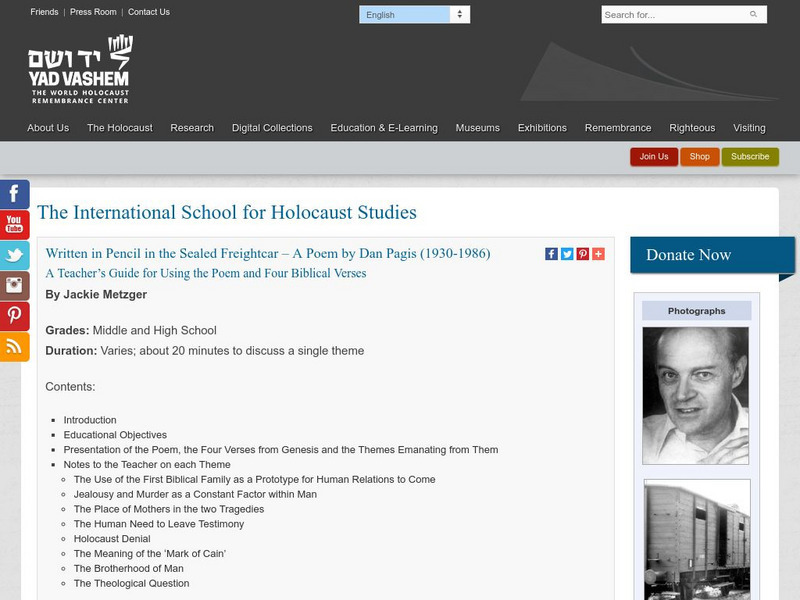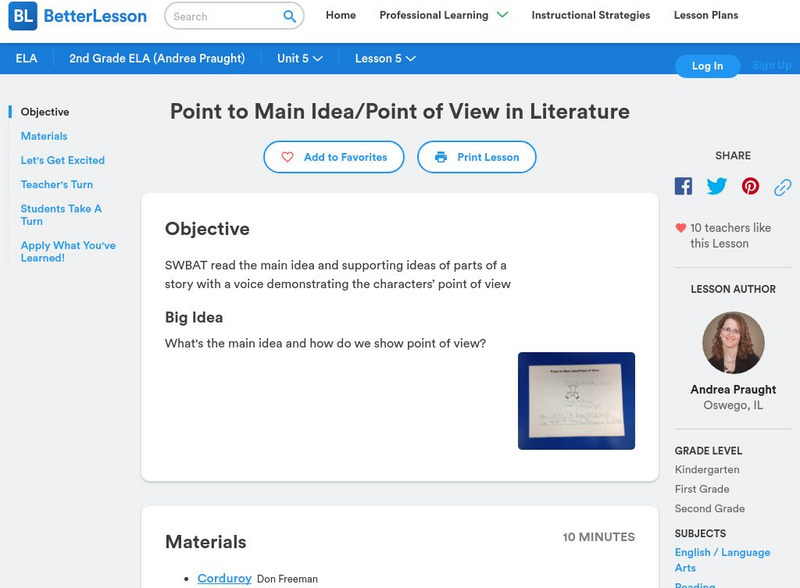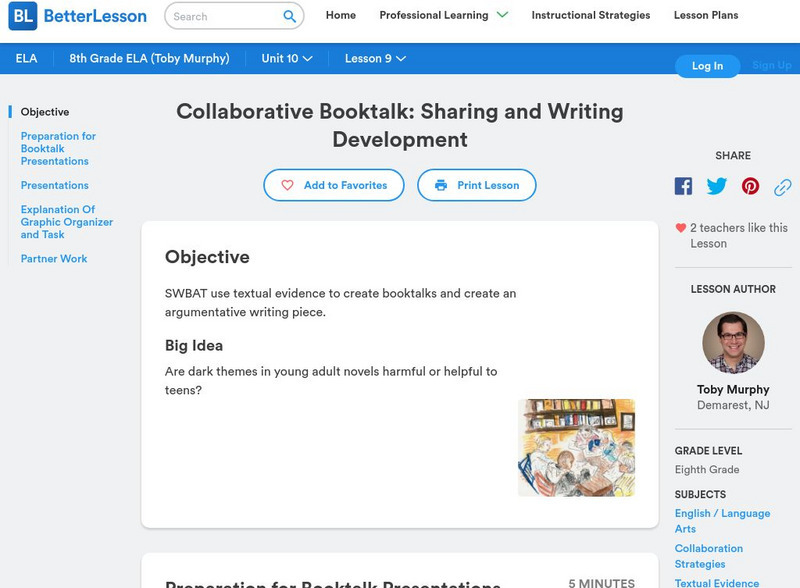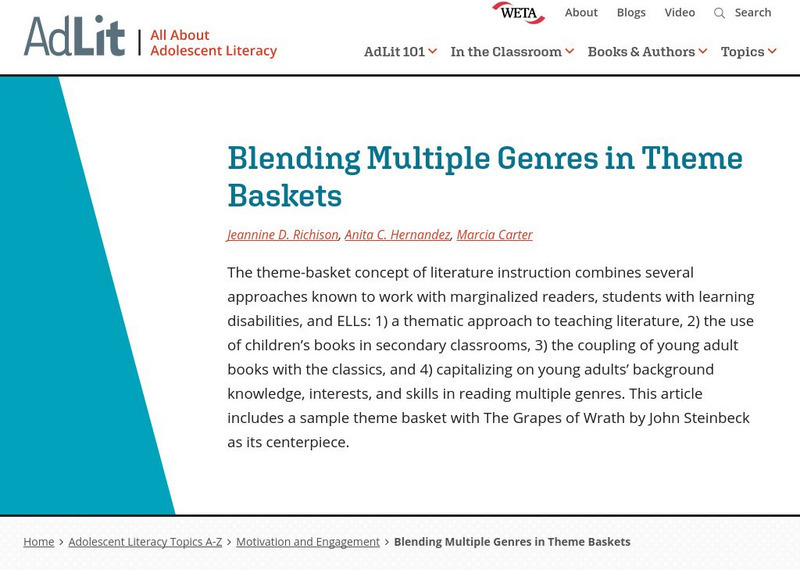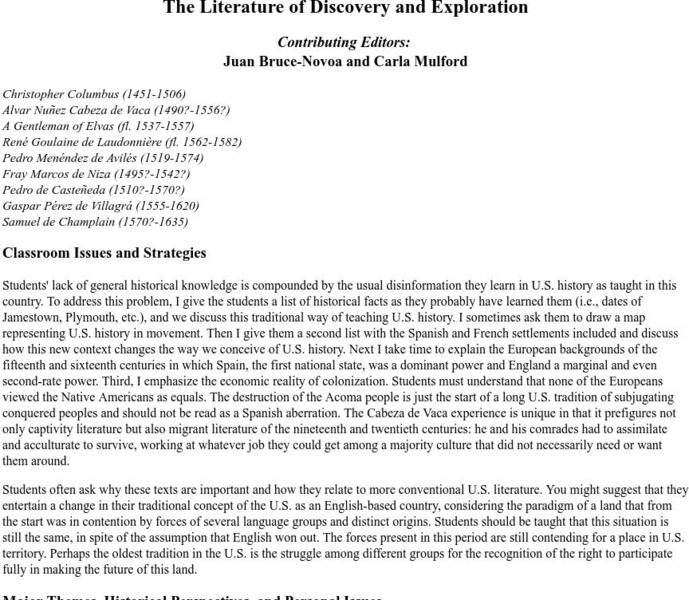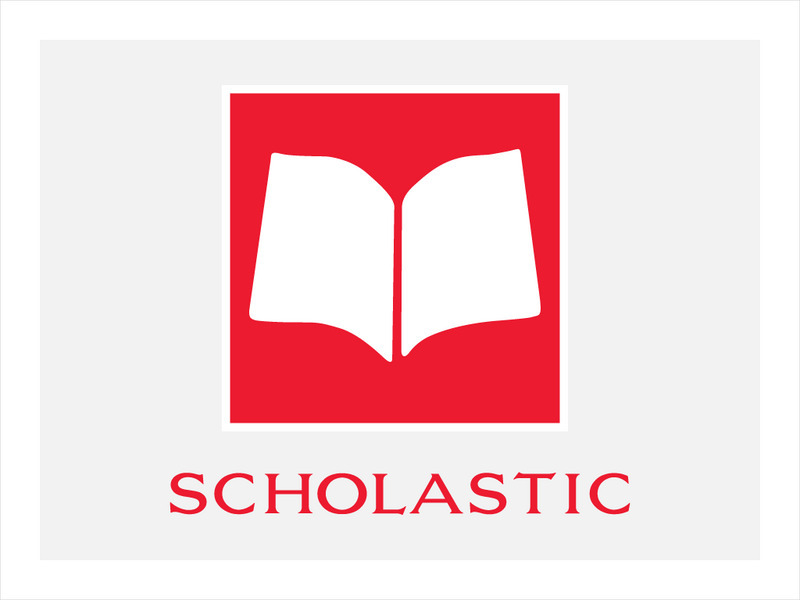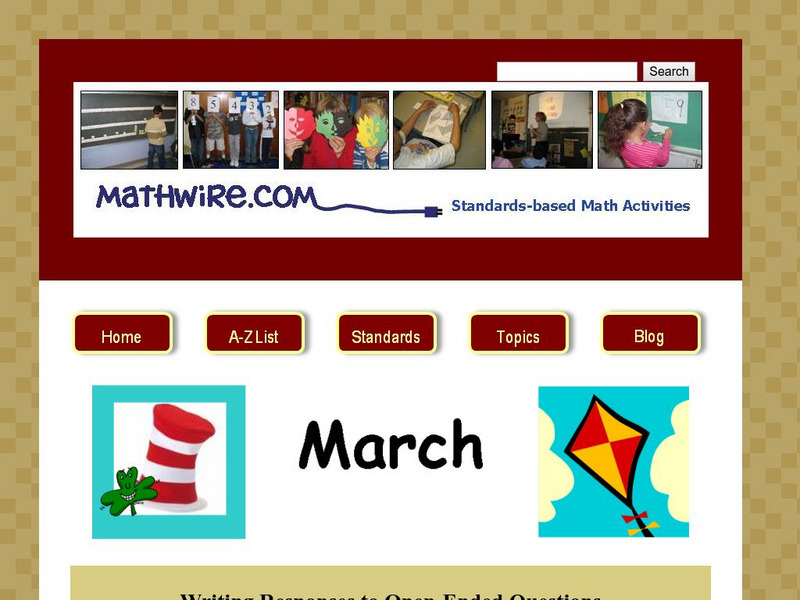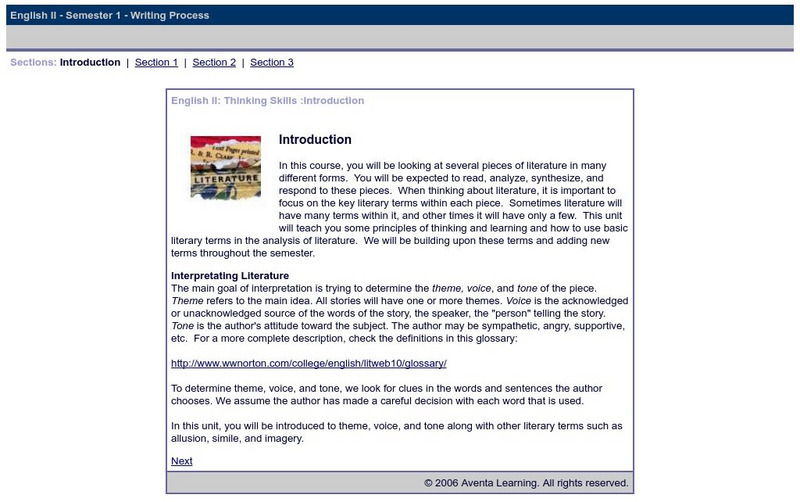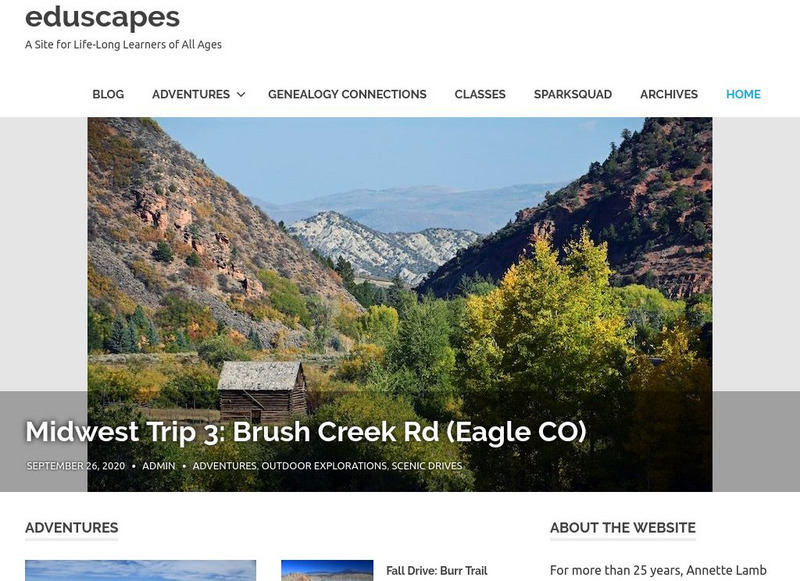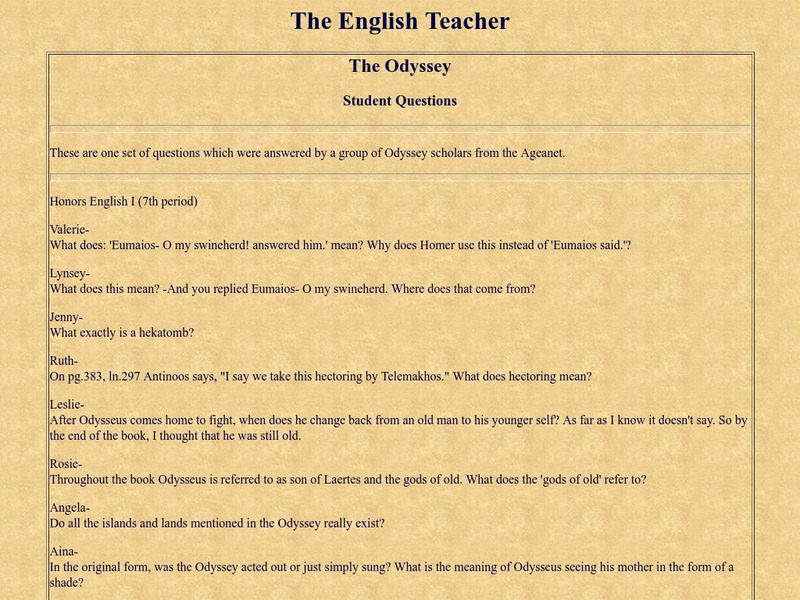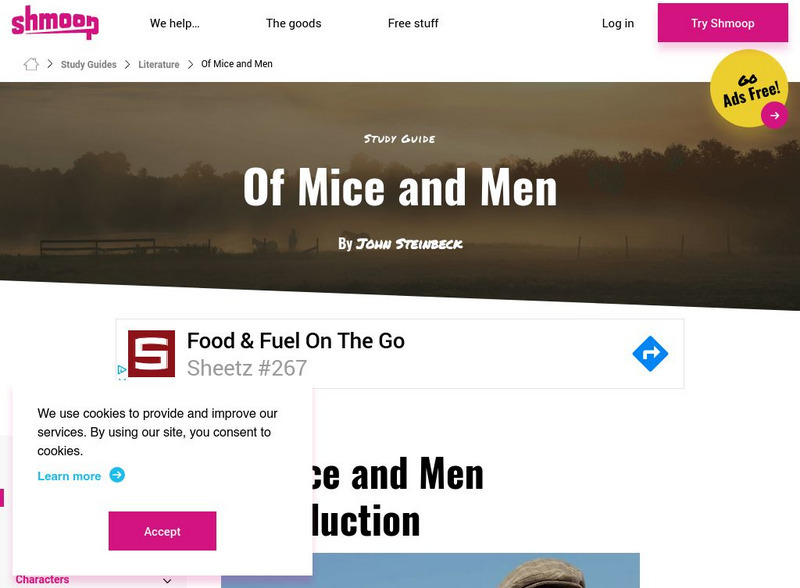British Library
British Library: 20th Century Teaching Resources: Angela Carter's Wise Children
In these activities, learners will focus on a wealth of drafting material and writer's notebooks to reveal how Angela Carter created her final comic novel, "Wise Children". They will closely examine fascinating source documents and...
Yad Vashem, The World Holocaust Remembrance Center
Yad Vashem: Written in Pencil in the Sealed Freightcar
Dan Pagis experienced the horrors of the Holocaust as a young child and only addresses the trauma he experienced through poetry. In the poem "Written in Pencil in a Sealed Freightcar" he uses Genesis and the murder of Abel by Cain as a...
TeachEngineering
Teach Engineering: It Takes Two to Tangle
Students explore the theme of conflict in literature. They learn the difference between internal and external conflict and various types of conflicts, including self against self, self against other, and self against nature or machine....
Better Lesson
Better Lesson: Point to Main Idea/point of View in Literature
This lesson uses the story Corduroy by Don Freeman to teach the main idea and supporting details of a story, as well as what we mean by the character's point of view. The lesson is done using print materials and a whiteboard with...
Annenberg Foundation
Annenberg Learner: Literary Visions
Twenty-six half hour videos on literary analysis for high school students that feature authors, scholars, actors and noted critics. Topics include The Art of the Essay, Setting and Character in Short Fiction, Responding to Literature and...
Better Lesson
Better Lesson: Collaborative Booktalk: Sharing and Writing Development
Are dark themes in young adult novels harmful or helpful to teens? Students will explore this question and will create an argumentative writing piece based on textual evidence. Videos of the lesson in action, examples of student work,...
AdLit
Ad lit.org: Blending Multiple Genres in Theme Baskets
The theme-basket concept of literature instruction combines several approaches known to work with marginalized readers, students with learning disabilities, and ELLs: 1) a thematic approach to teaching literature, 2) the use of...
Cengage Learning
Literature of Discovery and Exploration
Teaching approach that examines the writings of European New World explorers from the late 1400s through the 1600s. Includes Christopher Columbus, Alvar Nunez Cabeza de Vaca, Rene Goulaine de Laudonniere, Pedro Menendez de Aviles, Fray...
Scholastic
Scholastic Book Files: A Reading Guide to a Wrinkle in Time
This teaching guide accompanies Madeleine's L'Engle's book, A Wrinkle in Time. Setting, plot, characters, and theme questions are included, along with guided reading questions for each chapter.
Other
Paul Yee: 'The Boy in the Attic' Teaching Guide [Pdf]
This teaching guide provided by Paul Yee for his book "The Boy in the Attic" provides a summary of the story, discussion questions and classroom activities. The book explores the theme of loneliness as felt by a young boy who left his...
Other
Math Wire
This is an amazing Math site! The lesson activities are based on constructivist teaching. They are organized by topic, theme, standard, strand, alphabetically, etc. Each month new materials are posted related to season, celebrations, and...
TES Global
Tes: Different Cultures Poetry
[Free Registration/Login Required] Thsi PowerPoint lesson will lead students through Benjamin Zephaniah's poem titled "Carnival Days". Topics relative to slavery are included in the slideshow.
BBC
Bbc: Gcse Bitesize: "To Kill a Mockingbird"
A thorough overview of Harper Lee's "To Kill a Mockingbird," made specifically for students preparing to take the GCSE test. This site is beneficial to all students studying the novel or race relations in the 1930's. Links include...
TeachEngineering
Teach Engineering: Red Light, Green Light
Building upon their understanding of forces and Newton's laws of motion, students learn about the force of friction, specifically with respect to cars. They explore the friction between tires and the road to learn how it affects the...
Department of Defense
Do Dea: Thinking Skills
In this self-guided course, you will be looking at several pieces of literature in many different forms. This unit will teach you some principles of thinking and learning and how to use basic literary terms in the analysis of literature....
Louisiana Department of Education
Louisiana Doe: Louisiana Believes: English Language Arts: Grade 7: A Christmas Carol
Seventh graders learn that writers use stories and distinctive characters to teach us lessons. Students will explore how the choices of characters affect the plot and build the theme of a story. Students will come to understand that...
Shmoop University
Shmoop: A Rose for Emily: Resources to Use in the Classroom
Resources for A Rose for Emily by William Faulkner consist of a summary, analysis of themes and characters, a list of questions, and teacher resources.
Yale University
Yale New Haven Teachers Institute: Curriculum Units (1978 Present)
A collection of volumes of curriculum materials, organized by year, that were developed by teachers and cover a wide range of topics in science, social studies, language arts, math, etc. Each volume focuses on an over-riding theme or...
Varsity Tutors
Varsity Tutors: Web English Teacher: William Golding
Web English Teacher site provides a variety of resources to assist in the teaching of William Golding's works.
Other
Eduscapes
The creators of eduscapes have designed this website to share their love of learning and teaching with others. The site aims at effectively integrating technology into the classroom in a fun and seamless way. Use the site to get lesson...
The English Teacher
The English Teacher: The Odyssey Student Questions
Examples of honors student questions about themes and characters in "The Odyssey." The way you might respond to them can be used in creating your lesson plan.
TES Global
Tes: Romeo & Juliet 2006 Article: "Civil Blood"
[Free Registration/Login Required] This article "Civil Blood: Why Are the Capulets and Montagues at War?" by Carol Chillington Rutter, Professor of English Literature at Warwick University, discusses the themes of violence and love in...
Scholastic
Scholastic: Loser by Jerry Spinelli Lesson
This teaching plan offers an activity to do in the classroom as well as a list of other books with the same themes.
Shmoop University
Shmoop: Of Mice and Men
In 1936 Steinbeck took a journalistic assignment to investigate the migrant worker situation. His discoveries are reflected in Of Mice and Men. Shmoop provides a summary, investigates themes and characters, and also offers a number of...

